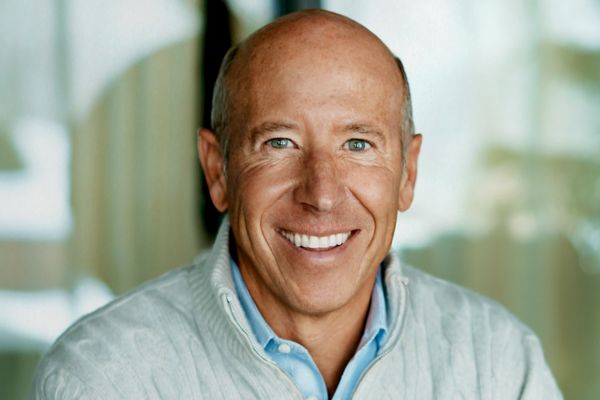In the 1968 film “The Swimmer,” Burt Lancaster bops from one backyard swimming pool to the next, an idyllic Connecticut suburb serving as the backdrop for his peripatetic progression. His endpoint, home, where his daughters await, playing tennis. The movie’s glossy setting belies its allegorical underbelly, expressing emptiness and disillusionment with the American Dream.
Barry Sternlicht, the billionaire real estate tactician, CEO of Starwood Capital Group, creator of Starwood Hotels, is the personification and gratification of the American Dream—antithetical to Lancaster’s “Swimmer” persona. But, aside from its doleful ending, Sternlicht and the film share some commonalities: Connecticut, pools, tennis. Growing up in Connecticut, Sternlicht just wanted to have enough money to one day own a pool and a tennis court. It’s a goal he essentially accomplished by his thirties. Connecticut boy done good. Real good.

THE LEAD UP
The anecdote was one of several Sternlicht shared during a 2024 podcast with Graham Bensinger and the least fascinating. His Jewish father survived World War II by hiding out with Czech partisans, at one point shooting and killing two German soldiers in an act of survival. His taciturn father was tough on him growing up, but he instilled in Sternlicht the drive to succeed by putting the work in. As a young boy, Sternlicht would catch tadpoles in a nearby pond and sell them for 10 cents a pop. He also peddled knives door to door, calling it one of the best jobs he ever had.
Cutlery, however, is not where Sternlicht would make his mark. Had he ended up becoming the “Knives King of Stamford,” then HOTELS Magazine would not be recognizing him as the Corporate Hotelier of the World for 2025.
His mother wanted him to be a lawyer. Instead, Sternlicht, a Brown University graduate, went into business, which, for someone with a self-proclaimed math phobia, was a leap. He wanted to work on Wall Street, and while Goldman Sachs showed interest in him, Sternlicht, after a stint as an arbitrage trader, took a position in Chicago with JMB Realty, where he found an early champion in co-founder Neil Bluhm. Despite success with the real estate company, before long, he was out of a job, felled by the savings and loan crisis. He was 30 and his wife was pregnant with their first child. He had gone from hanging with Michael Jordan at Bulls games to looking for a job.
Like MJ, Sternlicht had preternatural talent. Not long after, he and Bob Faith, who later founded Greystar, formed Starwood Capital Group, which began by snatching up distressed commercial real estate. It soon became the capital arm of Starwood Hotels and Resorts, which Sternlicht founded in 1995 and was chairman and CEO of for 10 years. Starwood’s acceleration was fueled by early acquisitions of Westin Hotels and fending off Hilton to buy ITT Corp., which gave it the Sheraton hotel chain. Sternlicht later created the seminal W brand, which became the first real scalable lifestyle hotel brand. W took cues from legendary hotelier and tastemaker Ian Schrager that had to do as much with style as substance—though, for W, maybe it’s the same thing. At one point, as Sternlicht retold it, the union-operated W New York had what could be described as unappealing doormen. Sternlicht sent them to the New York Sheraton and installed handsome replacements.
Sternlicht’s eventual departure from Starwood Hotels was fraught. He left soon after hiring the one-time president of Coca-Cola, Steven Heyer, as CEO. It was a fateful decision. Sternlicht would later call Heyer a megalomaniac, claiming that Heyer dismantled his office, fired Sternlicht loyalists and even passed around his picture to security guards. Though the board asked him to stay, Sternlicht declined. He felt hurt, like he was losing his baby.

A NEW STAR IS BORN
Ten years later, there is rebirth. Though Starwood Hotels & Resorts was sold to Marriott International in 2016, Sternlicht retained the rights to the Starwood name. In the interim, Sternlicht built out SH Hotels & Resorts, managing and evolving brands 1 Hotels, Baccarat Hotels and Treehouse Hotels. In March, the SH Hotels name was retired and renamed Starwood Hotels, a nostalgic appellation for erstwhile SPG loyalists in search of cool and hip. The brands may have changed, but the promise hasn’t, and the man behind it is even more energized this time around.
“Building Starwood Hotels this time is a labor of love,” Sternlicht said. “We have the benefit of moving at the right speed. While I was able to innovate at the design level at Starwood 1.0, now is the time with AI to also rethink how we operate and how we are organized. We love brands that mean something or that can be pivoted to own a niche.”
W Hotels was Sternlicht’s magnum opus. 1 Hotels is his reprise—a luxury, lifestyle brand heavily focused on sustainability and wellness complemented by biophilic design. W Hotels became a juggernaut, and Sternlicht says that 1 Hotels, with 15 currently open, is growing at an even faster rate. Sternlicht has made a fortune in real estate, but brands are a passion. During a recent industry conference, Sternlicht, who also serves on the board of Estée Lauder, floated a rather portentous message about consumer tastes and upstart brands—what he referred to as “piranha brands”—that are eating up older brands. “We have proven that smaller, nimbler brands that access all the distribution channels and social media can not only compete but excel versus the lumpy, older brands that have larger third-party owned fleets,” he said. “It’s harder to move when you have hundreds of hotels sporting a generation of design that is not as relevant.”

Starwood Hotels 2.0 is not nearly at the scale of its former self and may not achieve it again. Maybe that’s the point. Public lodging companies are typically rewarded on their ability to grow net units, which, as Sternlicht points out, can lead to a brand’s biggest sin: going stale. “It’s a constant battle both internally and externally to stay on brand and maintain our service ethos,” Sternlicht said. A brand should have specific character and promise; for Sternlicht, achieving both is heavily drawn from design. “Styling is an art,” he has said. Sternlicht will go into hotel rooms and shift the furniture around until it fits his eye. Lighting, he maintains, is crucial. “When I see hotels without dimmer switches, I want to castrate someone,” he pointedly said on the Bensinger podcast. Sternlicht sent designers of the upcoming 1 Hotel Tokyo pictures of Zen gardens to capture his vision.
“Hotels, more than any asset class, operate on feel,” he said. Consider 1 Hotel South Beach, a conversion of the Gansevoort. “The building didn’t move, the rooms didn’t change size, the city is the same city, but we embarked on a massive redesign, and not something ChatGPT can show you how to do,” he said. The hotel now runs rates as much as $700 higher than when it operated as a Gansevoort.
Not every deal is an outright success. “You learn more from your mistakes than from your successes and anyone who is on the playing field makes mistakes,” Sternlicht said. “The difference is what you learn and how you prevent it from happening again.” He points to Starwood Capital’s 2005 acquisition of Societe Du Louvre for $3.2 billion as one of those learning experiences, what he called “a defining transaction.” The deal included the Louvre Hotels Group and luxury assets like the Baccarat crystal company and the Taittinger champagne house. After revitalizing the portfolio, Starwood Capital sold Louvre Hotels to Jin Jiang International in 2015, while the remaining luxury assets were sold off separately, including four hotels in France. Though Starwood Capital and its LPs realized gains, the overall flow of the transaction did not go swimmingly.
Starwood bested other private-equity bidders for the deal, in part because Sternlicht befriended the company’s CEO and put a focus on the family legacy. Despite its partner TPG dropping out, Starwood soldiered forward. “We didn’t even have a fund large enough to buy the public company,” Sternlicht said, but the asset base, which included Hôtel de Crillon, was too good to pass up. The global financial crisis, however, was not baked into the deal. “We were well over $1 billion in the money on an equity check half that size when the financial crisis happened and our cash flow disappeared,” he said. “We had an opportunity to refinance all our equity out, but when 2008 happened, that moment disappeared.”

Sternlicht humbly said he took his eye off the ball— delegating when he should have been embedded. Still, in the 10 years it held the company, it doubled investors’ capital. “When we exited the last assets, the IRR fell just slightly below our fund’s investor preferred return and the parent earned nothing over 10 years. For me, it resulted in probably 60 trips to Europe to manage this conglomerate. The lesson was, when you have the chance to do something great, move fast,” Sternlicht said.
At 64 years old, Sternlicht still works at a breakneck pace. He admits it. “I am very busy, but I also do too many things,” he said. “Everybody who knows me wants me to slow down.” Most of all, his three children, one of which, Adrienne, is a world-ranked showjumper. “I’m trying,” he said.
Maybe not so hard. Though Sternlicht has a CEO of Starwood Hotels in Raul Leal to lean on, Sternlicht remains firmly fixed throughout the business lines. 1 Hotels has six hotels in some stage of development, including in Paris, while its sibling lifestyle-minded Treehouse Hotels recently opened in Manchester, U.K., and Sunnyvale, Calif. Like its peers, Starwood Capital has also pushed hard into the $3-trillion private credit market, having recently closed three private credit-focused vehicles totaling $2.86 billion.
Sternlicht is an avid sports enthusiast; fit, he skis, plays tennis and loves golf. He wouldn’t be that out of place bouncing around the piscinas of the Nutmeg State. “I’m just competitive,” he said. “If I do something, I’m always trying to get better at it,” which is not good news for those who try to take him on in the C-suite or the boardroom. “And I like to win.”
